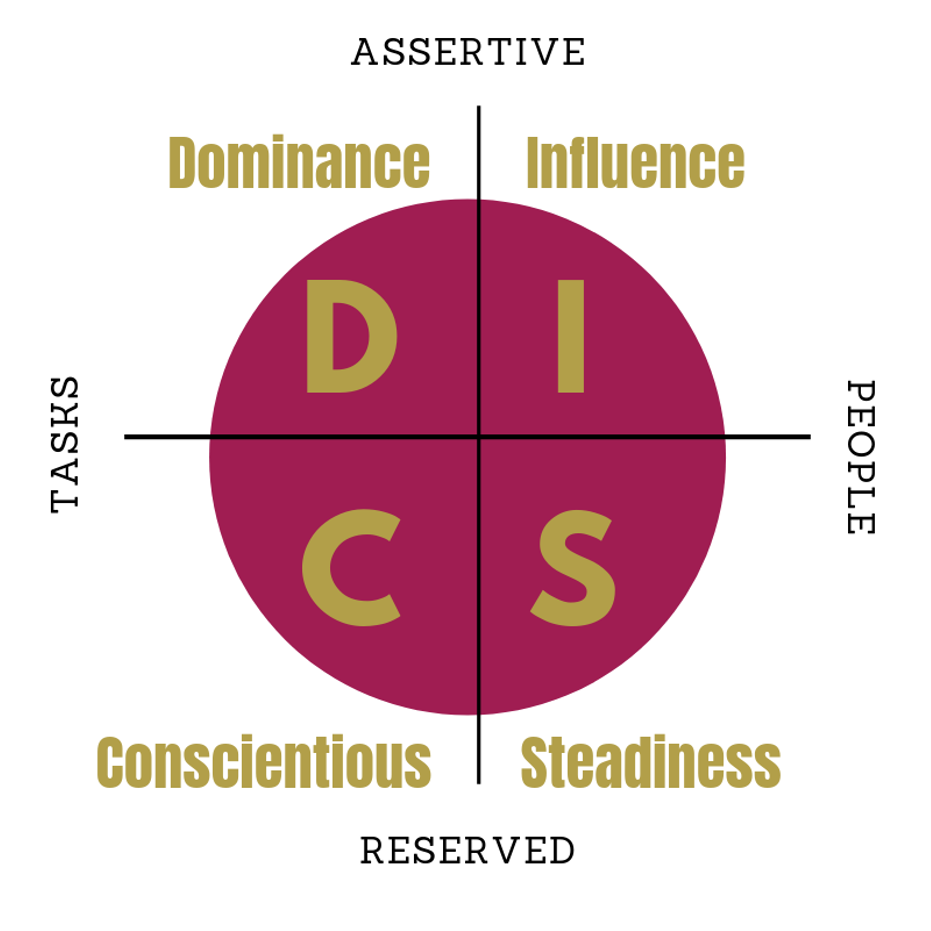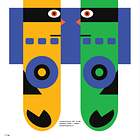CSP 020 - The Trinity of Career Development - grow YOUR career
Three tools to discover more about yourself
Hey Creative Souls,
I hope you are safe and well. This week’s edition is all about career growth and the use of three decent tools to discover more about yourself. To build a meaningful career, it’s important that it’s inline with who we are and what we’re good at.
In this edition:
Career growth comes from who you are
Where do you need to grow?
The Trinity of Career Development - three tools for self-discovery
My very own Trinity of Career Development
Career Growth
Many years ago I was completely and utterly stuck in a rut with my job.
I’d joined a Tech startup and ridden a wonderful wave of chaos. As money came in we grew, we scaled, we professionalised and we got stuff done. It was fun.
And then it wasn’t.
You see, I thrive in chaotic and highly driven environments. I cut through complexity and bring creative approaches to solve problems. I love to motivate people and embark on exciting journeys - like growing a startup.
I don’t thrive in steady, calm, business as usual kind of work.
Only, I didn’t really know this, not a deep level, until I was stuck in a rut.
I was so stuck that life was utterly miserable. I had creative projects, sure, but work was sapping all meaning. I was coming home drained of any enthusiasm. I was burning out, not from long hours, but from a lack of meaning in my work - and an under-utilisation of my capabilities.
So, I sat down one rainy Friday afternoon and did some research. I figured I needed to discover three things about myself.
What was I good at?
In other words, what were my strengths and what was a rubbish at?
What types of workplaces do I like?
And what types of roles would best suit me in those workplaces?
What did I really need in my life to be happy?
And could I, or should I, try and find that at work?
Here is an old YouTube video on this very subject. As I transition my channel over to Creative Soul Projects, these older videos still reference my consulting business Cultivated Management.
I discovered three tools that helped me understand myself. This was 15 years ago, and I now use these same tools when I coach other people, manage and lead teams and when I consult with companies.
I’ve discovered, through my consulting work, that a great many people are stuck. They feel a lack of growth, they don’t enjoy their jobs or maybe they feel under-utilised; they often have more to offer that is not being used.
And so I help them with the Trinity of Career Development.
The Trinity of Career Development
It consists of three tools, each one helping people discover more about themselves.
These tools are not scientific but they are indicative - and that is helpful.
Strengths
The first is any form of strengths discovery tool.
These assessment tools help you to discover what you are good at. They can help you identify patterns, behaviours and strengths, allowing you to align your choices and career around what you are good at. Success in our careers is more likely when we’re using our strengths.
Of course, there will be some weaknesses - and these may be holding you back. But again, you can aim to turn a weakness into a strength with the right training, learning and support. The first step is knowing about it.
When I was stuck in a rut I was essentially being asked every day at work, to use my weaknesses, not my strengths.
The one I use is Strengths Finder 2.0 - but it is pricey. Cheaper (and free) ones exist.
(Please note Creative Soul Projects cannot be held responsible for the use of your personal details on any external site)
DISC
DISC is a wonderful tool for working out what your natural preferences are for work and communication.
It is a behavioural tool not a mindset assessment. Behaviours are ultimately what matter the most - what we do, how we do it, what we say, how we say it - behaviours.
Behaviours are important - as they are why people want to work with you, communicate with you and hire you. They are essential and DISC can help you work out your default behaviour type.
The letter D in the top left segment stands for Dominance.
Imagine decision makers, task focused, assertive, determined.
The letter I in the top right segment stands for Influencer.
Imagine high energy, good personal communication, storytelling and people orientated.
The letter S in the bottom right segment stands for Steadiness.
Imagine harmony, strong inter-personal communication, peace making, people orientated.
The letter C in the bottom left segment stands for Conscientious.
Imagine attention to detail, task focused, process orientated, seeking perfection.
The top two types, D and I, tend to be assertive in that they believe they can exert influence on their world. The lower two, S and C, tend to be more passive, in a sense believing they have less influence on the world around them. They are more reserved and cautious.
The right hand two, I and S, tend to be more people focused. They are more trusting of people and focus more on people and belonging to social groups.
The left hand two, D and C, tend to be less trusting of people and hence put more focus on tasks, information, evidence and action.
As you can see already it’s important we have careers and jobs that align around our natural preferences.
With disc you have golden insights to yourself and how you naturally behave and communicate, but you also have the ability to try and understand others.
The trick then is working out how to move around the DISC behaviours for the environment you find yourself in, the person you are talking to (or working with) and understanding how to get along with almost anyone.
But more importantly, working out what types of companies and roles suit your natural preferences better.
I go into huge depth on DISC in the Communication Super Power Course.
For example, I like to inspire, motivate and tell stories - so leadership was a natural move for me (I’m a HIGH I with plenty of D). This is precisely why I was stagnating in a calm “business as usual” kind of role - there wasn’t anything energising to discuss, or move towards, or galvanize people around.
The tool I use is the free DISC tool from Tony Robbins.
(Please note Creative Soul Projects cannot be held responsible for the use of your personal details on any external site)
Happiness
Finally, there is the Authentic Happiness assessment which, in a nutshell, will give you the top 5 things you need in your life to bring more happiness.
It’s a pretty in depth survey but the results are wonderful.
The tool I use is the Authentic Happiness VIA survey - you will need to create an account before you can use this.
(Please note Creative Soul Projects cannot be held responsible for the use of your personal details on any external site)
The three tools in conjunction give you rich and meaningful insights into how to grow your career, keep your creative dream alive, communicate more effectively and work on using your strengths - all of which can help to bring about a more meaningful career.
What I will say is that we shouldn’t be seeking happiness at work - that is often found in our creative projects, or our relationships, or hobbies, or community activity.
You can find out more about career growth in the super free guide that all new subscribers receive - or to truly learn more about communication skills, check out the Communication Super Power Course.
Putting the Trinity into Action: Practical Steps
Take the Assessments: Complete all three assessments to gather data about yourself.
Analyse Your Results: Carefully review your results and identify patterns and insights.
Create Your "Trinity Profile": Summarise your key findings from each assessment on a single page, like mine below.
Reflect on Your Career: Evaluate your current role and career path in light of your Trinity Profile.
Identify Alignment and Misalignment: Determine where your career aligns with your strengths, preferences, and sources of happiness.
Develop an Action Plan: Create a plan to align your career with your Trinity Profile, including potential career changes, skill development, and lifestyle adjustments.
Seek Alignment: Make career decisions that align with your core self.
Leverage Your Strengths: Focus on roles that allow you to use your natural talents.
Acknowledge your weaknesses: Mitigate weaknesses, but don't try to fix every single one of them.
Align with Your Preferences: Seek environments and roles that match your communication and behavioural style.
Integrate Your Sources of Happiness: Find ways to incorporate activities and values that bring you joy.
My Personal Trinity Example:
By understanding my Trinity, I can make career decisions that align with my natural tendencies and sources of fulfilment.
I encourage you to use the Trinity of Career Development to gain deeper insights into yourself. This knowledge will empower you to make conscious decisions about your career and create a more fulfilling and aligned path.
Resources:
Strengths: StrengthsFinder 2.0
VIA Survey of Character Strengths: Authentic Happiness
Thanks for reading this article. If you enjoyed this edition of CSP, feel free to share it with others.
Until next time, where I’ll be sharing more ideas about creativity, learning and communication.
Cheers
Rob..
Support Creative Soul Projects
Creative Soul Projects is a reader supported creative outlet.
Your support and membership has helped to create lots of great content, and useful resources for other creative souls, around creativity, communication and personal learning.
If you’d like to support CSP, consider buying the following:
📒 Find more resources, free downloads and guides in the CSP Store.
🕋 Dig into the archive for great content.










